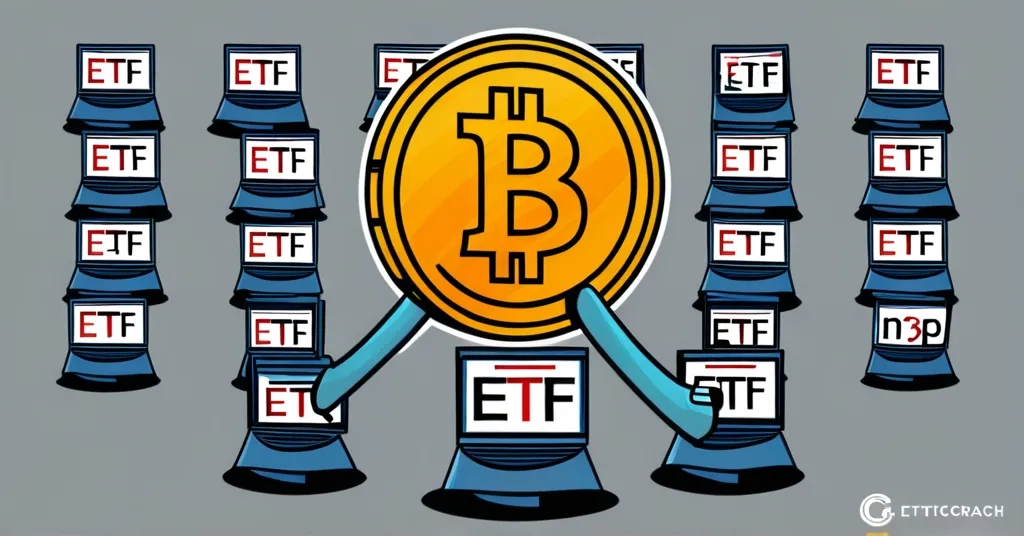Osprey Funds Shifts OBTC to ETF After Bitwise Deal Fails: 32 Bitcoin ETFs Now in U.S.

Osprey Funds Converts Bitcoin Trust to ETF After Bitwise Deal Falls Through
Osprey Funds, a U.S.-based investment management firm, has decided to convert its Bitcoin Trust (OBTC) into an exchange-traded fund (ETF) following the collapse of an asset purchase agreement with Bitwise. This move comes amid a growing U.S. ETF market, but it’s a reminder that the crypto world isn’t without its challenges.
- Osprey Funds converts OBTC to ETF
- Bitwise deal collapses over regulatory deadline
- 32 Bitcoin ETFs in U.S., managing $109 billion
The Failed Bitwise Deal
Osprey Funds, known for managing the Osprey Bitcoin Trust (OBTC) since its launch in February 2021, had hoped to merge with Bitwise, a fellow investment firm. Announced in August 2024, the deal promised to enhance Osprey’s offerings by aligning with Bitwise’s expertise. However, the merger fell apart when it couldn’t secure the necessary regulatory approval by the December 31 deadline. This regulatory delay is a classic example of the bureaucracy that can slow down innovation in the crypto space. Ever wondered how a failed deal could lead to a new investment opportunity? Well, Osprey didn’t let this setback derail their ambitions.
Osprey’s ETF Conversion
In response to the failed merger, Osprey Funds has decided to convert its Bitcoin Trust into a more mainstream exchange-traded fund (an ETF is a type of investment fund traded on stock exchanges, much like stocks). OBTC, which offers investors exposure to Bitcoin without the need to manage wallets or keys, has been a success story, managing approximately $186.7 million in assets as of January 7, 2025, with each share representing about 0.000326 Bitcoin. The conversion to an ETF is a strategic move that positions Osprey within a burgeoning U.S. market that now includes 32 Bitcoin ETFs, with 11 spot Bitcoin ETFs managing around $109 billion in assets as of January 15, 2025. If you’re new to crypto, here’s what you need to know about ETFs: they make it easier for investors to gain exposure to assets like Bitcoin without the complexities of direct ownership.
The Broader Crypto Ecosystem
While Bitcoin maximalists (those who believe Bitcoin will dominate the crypto market) dream of a world where Bitcoin reigns supreme, the reality is that altcoins and other blockchains like Ethereum offer diversity and innovation that Bitcoin alone can’t match. Osprey’s shift to an ETF reflects an understanding of this broader ecosystem, embracing the potential of decentralized finance while navigating the complexities of traditional financial regulations.
Other players in the market, such as Franklin Templeton and Hashdex, are also jumping on the ETF bandwagon, offering diversified exposure to both Bitcoin and Ether indices. Meanwhile, Bitwise isn’t out of the game entirely, having proposed an ETF focused on companies holding over 1,000 BTC in their corporate treasuries. It’s a competitive landscape where everyone is vying for a piece of the crypto pie, but it’s also fraught with challenges. From regulatory uncertainties to market volatility, the journey towards mainstream acceptance is anything but straightforward. Regulators are slowing down the crypto revolution, and it’s time they catch up!
Key Questions and Takeaways
- What prompted Osprey Funds to convert OBTC into an ETF?
The conversion was prompted by the termination of an asset purchase agreement with Bitwise, which did not gain regulatory approval by the December 31 deadline.
- How does OBTC provide value to investors?
OBTC offers investors exposure to Bitcoin without the complexities of direct investment, such as managing wallets or keys, and carries a low management fee of 0.49%.
- What is the current state of the U.S. Bitcoin ETF market?
The U.S. has 32 Bitcoin ETFs, with 11 spot Bitcoin ETFs managing around $109 billion in assets as of January 15, 2025.
- What other investment firms are involved in the Bitcoin and crypto ETF space?
Franklin Templeton and Hashdex have launched ETFs offering exposure to Bitcoin and Ether indices, while Bitwise has proposed an ETF focused on companies holding over 1,000 BTC in their corporate treasuries.
As we navigate this complex landscape, it’s clear that the journey to financial freedom and decentralization is a marathon, not a sprint. Osprey Funds’ pivot to an ETF might be a small step, but it’s one that could pave the way for greater mainstream adoption of cryptocurrencies. Yet, as with any good story, there are plot twists and turns, and the road ahead remains as unpredictable as ever. The crypto space is ripe with opportunity, but it’s also filled with pitfalls. Stay informed, stay critical, and let’s keep pushing for a future where decentralization and innovation thrive.



